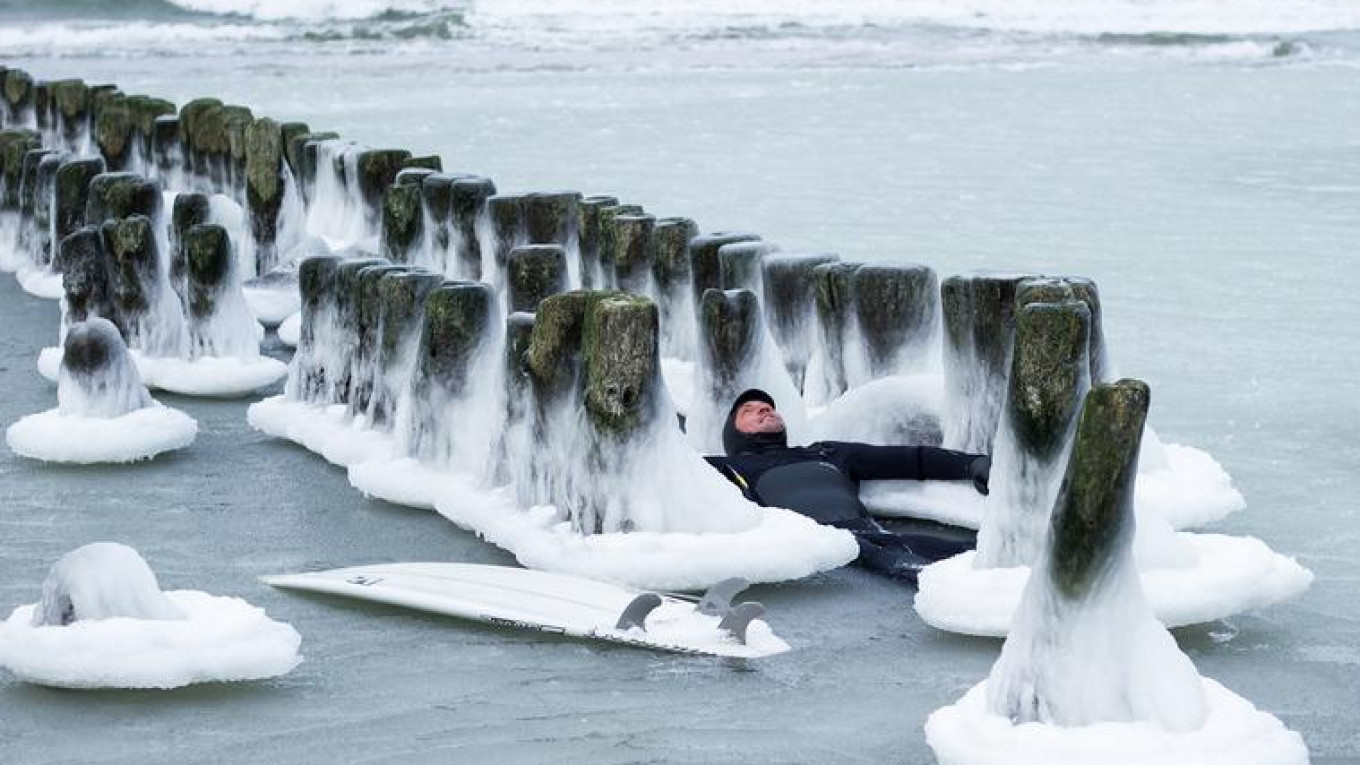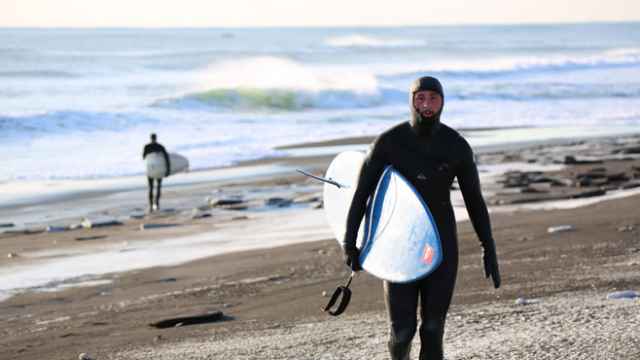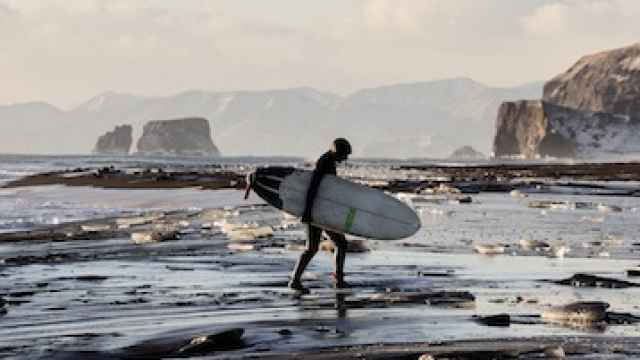As a young student in St. Petersburg in the early 1990s, Sergei Rasshivayev thought he had a better chance of flying to space than becoming a professional surfer.
It didn’t even occur to him to try surfing (he didn’t even know what surfing was) until he saw the 1991 Hollywood blockbuster “Point Break,” starring Keanu Reeves and Patrick Swayze, in which an FBI agent goes undercover to take down a gang of bank-robbing surfers.
Compared with finding a board — and waves to ride — in Russia, rocketing to the moon seemed easy. “The steps I had to take to get there were clear to me: College, exams and that’s it — I’m an astronaut,” Rasshivayev told The Moscow Times. “With surfing, nothing was clear. And it took a long time to get into it.”
It took 16 years after he first saw the cult classic for him to ride his first wave — on a holiday in Europe. But in the years since, Rasshivayev has seen a growing number of Russians realize their country’s unlikely surfing potential.
With the sport now included on the Olympic agenda, a new generation of Russian surfers is eyeing the Tokyo 2020 Games as a chance to win recognition abroad and at home. Their first step to qualification begins at the national championships on July 15 in Kaliningrad, Russia’s exclave on the Baltic Sea.
“I overcame a lot to get into surfing,” Rasshivayev told The Moscow Times. “It’s become much more accessible now.”
‘There Was Nothing’
Denis Drogaikin, an extreme-sports enthusiast, first tried surfing on the Indonesian island of Bali after graduating from university, and was immediately hooked. He thought he would be able to connect with other surfers back in Moscow through a club or school. “But there was nothing,” he says.
Together with a couple of friends, Drogaikin put together a training camp. As more people asked to join, he quit his day job in logistics and founded the Surfway Moscow school. Four years later, he is a full-time instructor there.
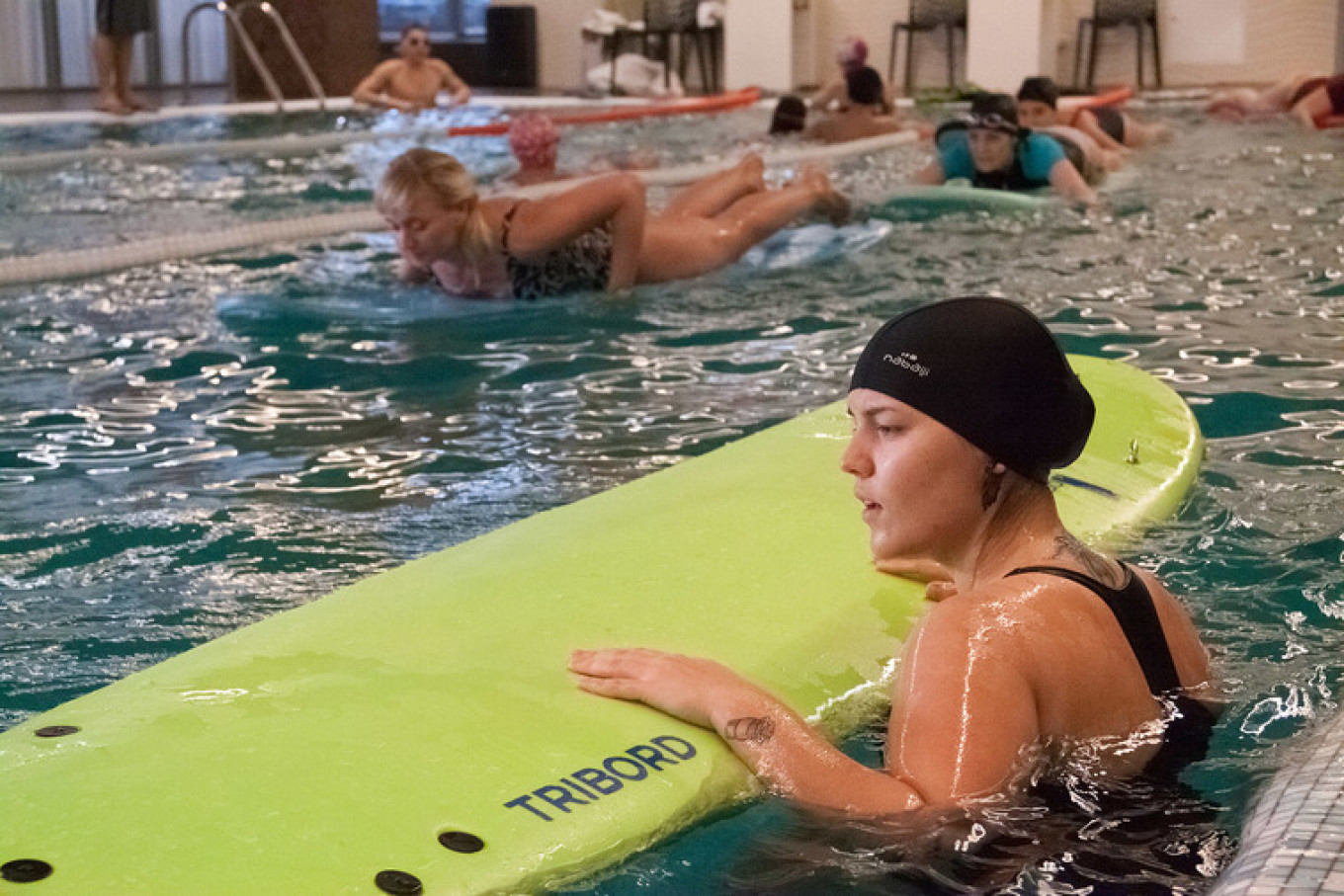
The school coordinates surfing trips and land-based training programs, which includes underwater weight exercises and paddling on surfboards.
At first, Moscow’s athletic centers were resistant to the onslaught of surfers paddling in their pools. And the surfers still get plenty of strange looks: “When you tell people you want to paddle on a board in the pool, they think you are a little ill,” Drogaikin said.
Most who come to the beginner lessons at Surfway aren’t professional athletes. They are women in their 20s, Drogaikin says, or “people who have ordinary lifestyles” who want to try surfing before going on a beach vacation.
“They go to the ocean and look at surfboards like hungry dogs look at bones,” Drogaikin says. “They want to try, but they can’t bring themselves to. But here in Moscow, they train for six months before the trip, go and get completely different results.”
'I'm at Home'
Like Drogaikin, many come back eager to surf again. Some Russian surfers are even braving their country's harsh climate and remote coastlines to catch their next wave.
From Kaliningrad on the Baltic Sea and the Kuril Islands in the Pacific Ocean to Sochi on the Black Sea, a handful of far-flung reaches of Russia are emerging as prime surfing spots.
The conditions in these spots make them less attractive than the sun-soaked beaches of Bali or Hawaii. But for Drogaikin, his first wave in Russia — on the Kamchatka Peninsula — was an emotional one.
“The feeling you get when you’re riding a wave in your motherland, against a backdrop of volcanoes and with friends is really powerful,” Drogaikin said. “I experience the strongest emotions when I surf in Russia because I am at home.”
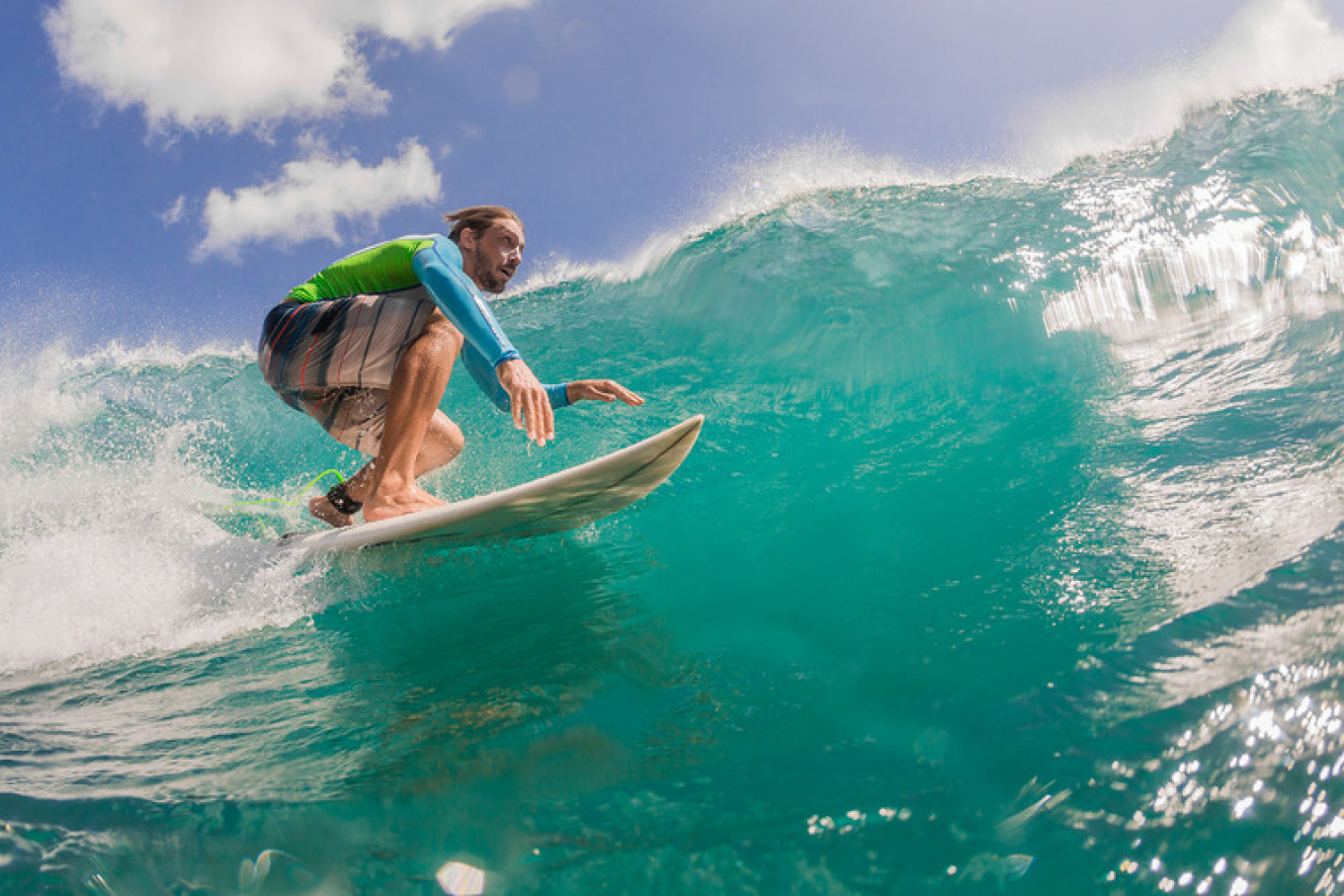
Rasshivayev, who worked as a surfing instructor in Europe and the Dominican Republic, was hit with the same euphoria when he rode his first wave in the Russian Far East city of Vladivostok.
It was “absolutely unbelievable,” he said. “At that moment I understood perfectly that the surfing journey of my life brought me back to my native country.”
But it is the sub-zero temperatures and price of getting to these remote regions that concern many other Russian surfers, including Darya Strekalina, a research assistant at the National University of Science and Technology. She has surfed in Morocco and the Dominican Republic, but never in Russia.
“It costs about the same to go to Kamchatka as a trip to Bali,” Strekalina explained to The Moscow Times. “And Russians are more likely to go to Bali. Kamchatka is more for fanatics.”
It was this kind of skepticism that motivated Tatiana Tsibikova to found the Surfest Russia festival three years ago. After a surfing trip to Murmansk, in northwestern Russia, Tsibikova says she came back “changed” and became a staunch campaigner for surfing in Russia.
With Surfest — a day of lectures, activities and exhibits — she tries to encourage Muscovites to take up surfing; she wants them to know that it is possible to surf at home.
“A lot of people laugh or are surprised. Surfing in Moscow? We don’t even have a sea, not to mention an ocean,” Tsibikova says, echoing the disbelief she hears. “It will take time to show them that it is possible to surf in Russia.”
Tokyo 2020
Since surfing was included on the Olympic agenda in 2016, there has been growing interest in competitive surfing across the country. A national surfing championship starting this summer in Kaliningrad, St. Petersburg and Sochi will determine who is eligible to compete for places on Russia’s Olympic team.
But Yevgeny Isakov, a Kaliningrad native who started the Konig Surf Club in his hometown and has surfed competitively for Russia, says the sport still struggles to be taken seriously.
“The term ‘professional surfer’ is something of a fantasy right now,” he says. “Several generations need to pass until surfers are seen as professional athletes.”
Still, Russian surfing has come on leaps and bounds since Rasshivayev first saw “Point Break.”
A surfing federation, headed by Rasshivayev, was established in 2008. In 2015 surfing was recognized as an official sport by the Russian government. Competitions have been held regularly since 2010 and the federation is looking for partners to build an artificial wave pool in Moscow.
“I am unbelievably jealous of them all,” Rasshivayev said of Russia’s budding surfers and the relative ease with which they can take up the sport. “For me, getting into surfing required a lot of determination.”
A Message from The Moscow Times:
Dear readers,
We are facing unprecedented challenges. Russia's Prosecutor General's Office has designated The Moscow Times as an "undesirable" organization, criminalizing our work and putting our staff at risk of prosecution. This follows our earlier unjust labeling as a "foreign agent."
These actions are direct attempts to silence independent journalism in Russia. The authorities claim our work "discredits the decisions of the Russian leadership." We see things differently: we strive to provide accurate, unbiased reporting on Russia.
We, the journalists of The Moscow Times, refuse to be silenced. But to continue our work, we need your help.
Your support, no matter how small, makes a world of difference. If you can, please support us monthly starting from just $2. It's quick to set up, and every contribution makes a significant impact.
By supporting The Moscow Times, you're defending open, independent journalism in the face of repression. Thank you for standing with us.
Remind me later.


